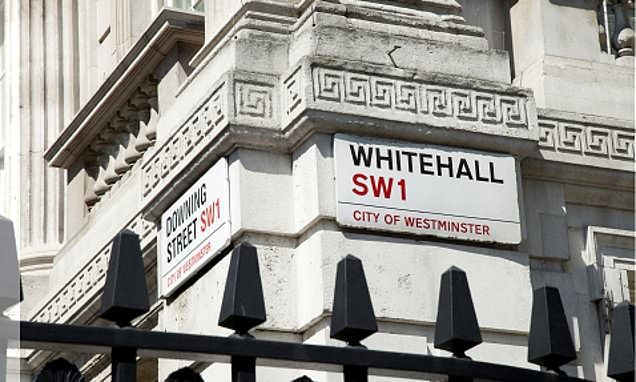‘Shocking’ figures show Whitehall civil servants took over 770,000 sick days last year – with a 38% increase in ‘mental health sick days’ compared to year before
- There was an increase from 558,125 to 777,443 days of sick leave, figures show
- Labour said the figures showed a ‘crisis’ of mental health throughout Whitehall
Mental health sick days taken by Whitehall civil servants have risen by 38 per cent in a year – with unions blaming staff cuts, low pay and long hours.
Last year officials working for government departments took a record 771,433 days of sick leave, a ‘shocking’ rise on the 558,125 recorded in 2021.
The figures, obtained by the Labour Party under freedom of information laws, revealed the Ministry of Justice was the department with the highest number of mental health sick days.
Last year its staff took an average of 3.32 days off each for mental health, up from 2.58 days the year before, at a total of 280,597.
Staff at the Department for Work and Pensions took off almost as much time as them between 2021-22, at 236,365 in total.

Last year officials working for government departments took a record 771,433 days of sick leave, a ‘shocking’ rise on the 558,125 recorded in 2021
Meanwhile the Ministry of Defence recorded the third highest total of 88,723 days last year.
The amount of mental health-related sick leave taken across Whitehall has been rising for the past decade.
But unions representing government workers blame the impact of Covid, increased workloads, staff cuts and long hours.
Lucille Thirlby, assistant general secretary of the FDA which represents civil servants, said: ‘Excessive workloads and working hours are long-running issues across the civil service and have had a huge impact on people’s mental health.’
Labour hit out the Conservatives for not supporting workers with anxiety and depression, claiming the figures ‘revealed a mental health crisis at the heart of Whitehall’.
A survey published last November in an FDA report into hybrid remote-working showed 77 per cent of respondents did some unpaid extra hours of work each week.
General secretary of the PCS union, Mark Serwotka, said: ‘These figures demonstrate the devastating impact the Government’s appalling treatment is having on workers.’
Mr Serwotka said the results underlined the ‘scandalous’ extent of mental health problems in the civil service, particularly after the pandemic.
A government spokesperson told The Guardian: ‘The civil service continues to improve its approach to health and wellbeing to help employees access the support they need to stay in or return to work and fulfil their potential.’
The figures come after it was revealed twice as many civil servants as people in the general population reported suffering from Long Covid last year.
More than one in ten officials said they had the condition – defined as symptoms lasting more than four weeks after first catching the virus – in autumn 2022, of which 7.4 per cent said it affected their everyday life. This compares with 3.3 per cent of the public.
Despite this, poor mental health is still the largest cause of long-term sickness in Whitehall, accounting for 41 per cent of absences.
Mental health was followed by musculoskeletal system disorders, such as arthritis or fractured bones, which accounted for 13 per cent of absences. Covid came in fourth as a cause of long-term sickness among civil servants.
Overall, the average number of working days lost to sickness in general in the civil service rose by 29.5 per cent on the previous year.
Absence rates varied across Whitehall, ranging from 2.5 days at the former Department for International Trade, to 12.1 days at the Ministry of Justice.
Source: Read Full Article

